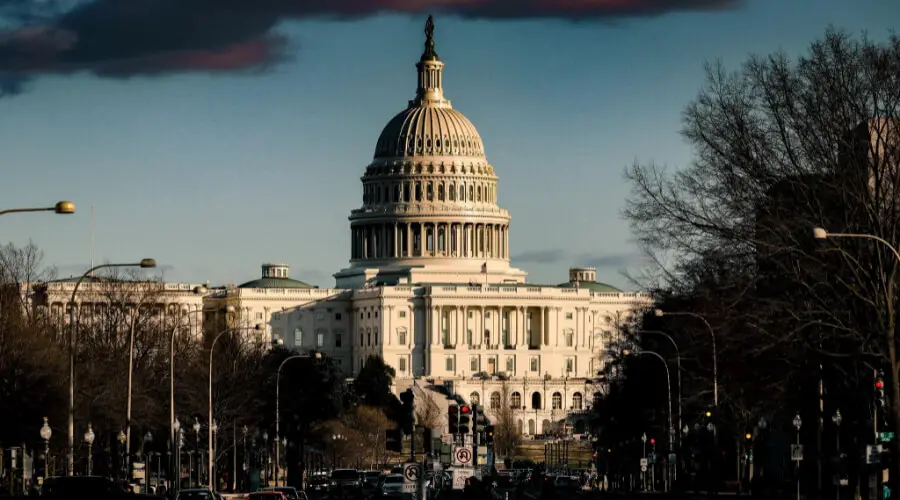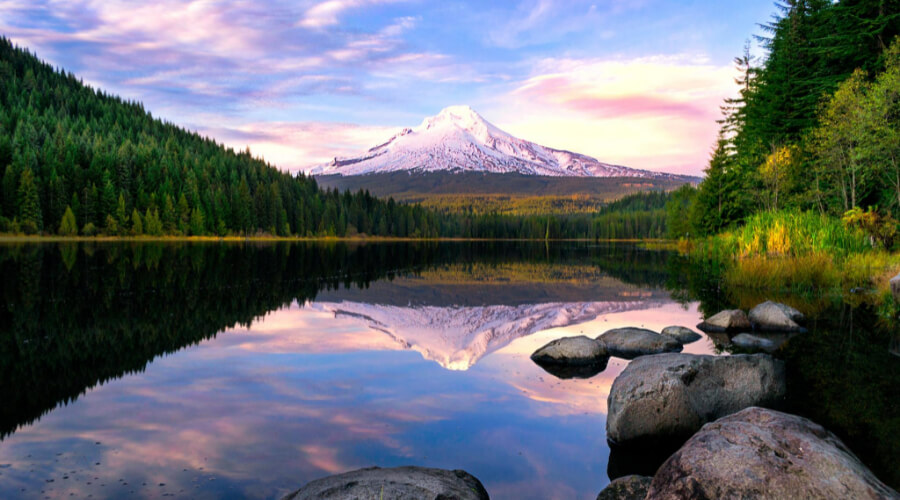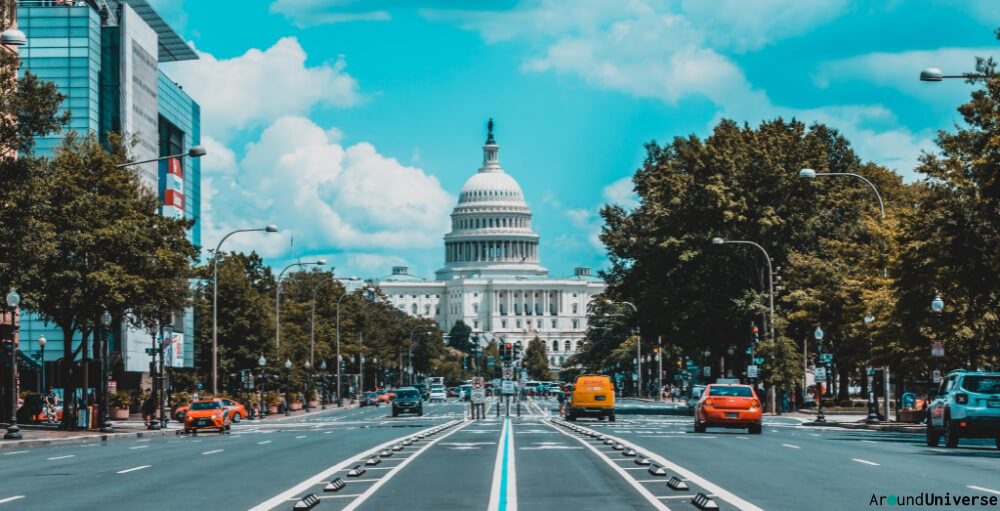Washington vs Oregon: which state is better? We are going to discuss the key differences and essential takeaways for Washington vs Oregon. The two states have many similarities and some glaring differences that you need to know about before deciding where to go on your next vacation. So, if you’re thinking about visiting Washington or Oregon this year, keep reading!
Washington

Washington has a wide variety of exciting sights to see. Some popular destinations in Washington are the Seattle Space Needle, Mt Rainier National Park, and Olympic National Park. Washington is also known for its wine country and microbreweries – with over 400 wineries and more than 100 breweries!
Washington has a wide variety of exciting sights to see, while Oregon is known for its wine country and microbreweries as well as Crater Lake and Cascade volcanoes (Mt Bachelor)
Oregon

Oregon’s most notable sightseeing attraction is probably Crater Lake; this picturesque lake was formed when an ancient volcano erupted thousands of years ago. Oregon also features Cascade volcanoes (Mt Bachelor) and dense forests that seem endless – perfect for hiking or camping trips. Plus, you can stop by Multnomah Falls on your way from Portland up to Salem! Of course, Oregonians love their beer, too, with over 100 craft breweries scattered all around the state.
What Is The Weather Like In Washington And Oregon?
Washington’s temperature varies wildly, depending on where you are located. Western parts of Washington see hot summers with low humidity, while eastern Washington has more rain but higher temperatures during those months. Portland sees milder winters than Seattle (though colder air from Canada can bring wintry conditions to both cities).
Oregon’s climate is classified as “cool dry”, which means that it features cold nights with warm days. The coast often records foggy mornings when there is a lot of moisture in the air; inland areas usually experience some snowfall every winter season.
What Are Some Differences Between Washington And Oregon?
Washington has many different varieties of scenery depending on where you go. At the same time, Oregon is drier with high temperatures in the summer months – however, it does get colder during the winter season than Washington. Washington has rainier summers but less humidity compared to Oregon’s milder winters; Portland sees warmer weather than Seattle though they both occasionally see wintry conditions from Canada and have four seasons each year (fall, winter, spring, and summer). Other key differences include:
– Crater Lake is one of Oregon’s most notable sightseeing attractions. In contrast, Olympic National Park might be Washington’s most famous attraction due to its proximity to Seattle and Mt Rainier National Park.
– Washington has more microbreweries and wineries than Oregon, famous for its craft breweries (over 100) instead of wine country.
– Portland sees less foggy mornings during the winter season – Washington’s coast often records foggy mornings when there is a lot of moisture in the air. In contrast, inland Oregon will experience snowfall every year.
– Washington has many different varieties of scenery depending on where you go, while Oregon is drier with high temperatures in the summer months – however it does get colder during the winter season than Washington.
Is It Better To Live In Oregon Or Washington?
This is a difficult question to answer. Factors such as climate, cost of living, and employment opportunities will all come into play when it comes time to decide where you want to live – so make sure that you do your research before making the final decision! You may also want to consider proximity for commuting or visiting family members; if this is an essential factor in deciding where to move, then Washington might be preferable because significant cities are located closer together (Seattle and Portland). The United States Census Bureau has data on median household income by state too, which can give you more insight into what life will look like after moving.
Also, some people prefer Oregon’s colder winters over hotter summers, whereas others find the opposite true. Ultimately, it’s up to you and what matters most, but this blog post should help serve as a guide for where the key differences lie in deciding between Washington or Oregon.
Is It Cheaper To Live In Oregon Or Washington?
According to the United States Census Bureau, both Washington and Oregon are cheaper states to live in than California.
Oregon: $1400/month median household income vs $1800/month for Washington
Washington: $2200/month median household income vs $2600/month for Oregon
To decide where you want to move, you must have all of this information at your fingertips before making a decision – so be sure to do thorough research into what life would look like after moving!
It’s not easy to decide between two such incredible places as Oregon or Washington. When they both offer something unique, significant cities are located closer together in Washington (Seattle and Portland). Still, Oregon has a beautiful coastline to explore with some of the densest rainforests in the country.
What Is The Cheapest City To Live In Oregon?
The cheapest city to live in Oregon is Grants Pass. Grants Pass has around 50,000 people, and the median income for households was $14,900 (2017).
Median household income: $1400/month; Cost of living index: 107.76% higher than the national average; Average home price: $293,500
Some other major cities include Eugene, with a cost of living index that is 109.06% higher than the national average at 110%;
Salem, which sees an increase of 111.82%; or Portland, which has seen a 115% increase from what it would be if it were on par with the United States as a whole – but this doesn’t make it any less expensive to buy homes there.
What Is The Cheapest City To Live In In Washington State?
The cheapest city to live in in Washington state is Shelton. However, the median income for households was $19,600, and the cost of living index is 98.79% higher than the national average – so it’s a bit more expensive there!
Shelton has seen an increase in population from around 15,000 people (2000) to about 20,000 now. Some other major cities include Spokane, which has had a decrease in housing prices due to lower demand on homes over the past few years at 102%; or Bremerton, which saw an overall decline across all categories, including but not limited to: wages, home values, and unemployment rates.
Some might find this a beacon of hope for those looking for cheaper city options in Washington, but it’s essential to be aware of the general decline across all areas.
What Is The Average Wage In Washington?
Washington has an average wage of $45.54/hr.; Oregon’s was significantly lower at only around $36.69/hour – but this would depend on significant factors such as location and profession. Some professions that are typically higher paid include nurses or teachers, for instance – so make sure you look at what your job will be before deciding which state might suit you best!
Some other occupations that pay more than average in Washington: Management level positions, Computer Systems Engineer, Nurse Practitioner (Nurse Anesthesia), Architectural Technician, Chief Executive Officer- Companies with 100+ Employees; while some jobs that can sustain living costs despite wages in Washington being lower are: Medical Assistant, Registered Nurse (Nurse Practitioner- Family), Flight Attendant or Airline Pilot.

